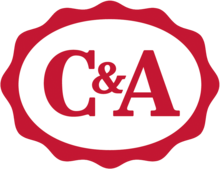C&A Brenninkmeijer
 |
|
| Private | |
| Industry | Retailing |
| Founded | 1841 |
| Founder | Clemens and August Brenninkmeijer |
| Headquarters |
Vilvoorde, Belgium Düsseldorf, Germany |
|
Area served
|
Much of Continental Europe |
|
Key people
|
Alain Caparros (CEO) Knut Bruggemann (Executive) Thorsten Rolfes (Executive) |
| Products | Apparel/Footwear specialty |
| Revenue |
|
|
Number of employees
|
50,000 |
| Parent | Cofra Holding AG |
| Website | www |
C&A is an international chain of fashion retail clothing stores, with European head offices in Vilvoorde, Belgium, and Düsseldorf, Germany. It has retail stores in many European countries. It serves only the largest markets of Asia, North America and South America. C&A's brands include Angelo Litrico, Canda, Clockhouse, Here+There, Palomino, Rodeo (ski and snowboard clothes), Westbury, Yessica, Yessica Pure, and Your Sixth Sense.
The Brenninkmeijer family owns the C&A group through its Swiss company Cofra Holding AG. The company's success has led the family to considered, by the Dutch, among the wealthiest in the Netherlands. The Brenninkmeijer family, however, live in Geneva and Zug, Switzerland.
The company was founded by brothers Clemens and August Brenninkmeijer in 1841 as a Dutch textile company, taking its company name from their initials. In 1906 Clemens' son, Bernard Joseph, started discounting in Amsterdam (Rekenen in Centen, in plaats van Procenten) and by 1910 there were ten stores in the Netherlands. These were from the German Brenninkmeyer family that traded in linen and textiles since the 17th century from its hometown of Mettingen, Germany.
For many years, C&A retail clothing stores were a major presence in town centres throughout the United Kingdom. C&A also opened stores in a number of out-of-town locations, most notably its store at the Merry Hill Shopping Centre in the West Midlands, which opened in November 1989. The company's strategy of selling budget clothes from high-rent city-centre retail stores made it vulnerable to a new breed of competitors operating in cheaper, out-of-town locations, including Matalan and the rapidly expanding clothing operations of supermarket food chains such as Tesco and Asda, and to expanding high street names such as H&M, Zara, and Topshop. C&A in the United Kingdom was a notable example of an incorporated private unlimited company, which meant that it was not required to publish its financial statements under United Kingdom company law. In 2000, C&A announced its intention to withdraw from the British market, where it had been operating since 1922, and the last UK retail stores closed in 2001.Primark bought 11 of the C&A stores.
...
Wikipedia
